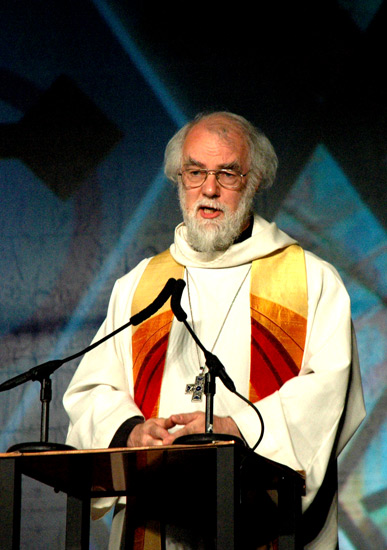Anglican leaders across the global body say the election of a second openly gay bishop demonstrates the direction The Episcopal Church has been heading all along – away from biblical Christianity.
"Unfortunately, this election provides further clarity to the rest of the Anglican Communion," said Bishop David Anderson, president and CEO of the American Anglican Council. "Should the rest of The Episcopal Church consent to this election, there can be no more pretending that The Episcopal Church holds to Anglican Communion doctrine and 2,000 years of biblically based Christian teachings."
The Rev. Canon Mary D. Glasspool, a lesbian who has been with her partner for 19 years, was elected Saturday to the office of bishop suffragan in the Diocese of Los Angeles.
The Rt. Rev. V. Gene Robinson, the first openly gay bishop to be consecrated in The Episcopal Church, released a statement declaring The Episcopal Church "the inclusive Church."
While welcoming Glasspool's election, Robinson noted that she was elected for her "experience, skills and faith" and that she "happens to be a lesbian."
Glasspool's election must be confirmed by the bishops and standing committees of The Episcopal Church's other 108 dioceses over the next few months. Her confirmation may exacerbate already strained relations within the global Anglican Communion.
"Confirmation of this election will make clear beyond any doubt whatsoever that the TEC (The Episcopal Church) leadership has chosen to walk in a way which is contrary to scripture and will continue to do so," said the Most Rev. Peter Jensen, archbishop of the Diocese of Sydney, Australia. "This settled path that the TEC chooses is contrary to the expressed will of the majority of the Anglican Communion."
The Episcopal Church – the U.S. arm of Anglicanism – widened rifts in the global body when it consecrated Robinson as bishop of New Hampshire in 2003. In an effort to prevent schism, Anglican leaders from across the Communion, including those in the United States, in 2006 passed a resolution urging restraint concerning the election of bishops whose "manner of life" – namely partnered homosexuals – would cause offense to the wider Anglican Communion.
But this past July, The Episcopal Church's highest legislative body adopted a resolution opening the ordination process to all baptized members, including practicing homosexuals.
Episcopal Presiding Bishop Katharine Jefferts Schori has insisted that the resolution did not repeal the 2006 agreement to practice restraint, but recent actions have demonstrated otherwise, conservative bishops have noted.
"What you have is a witness of incoherence from The Episcopal Church," said the Rev. Kendall Harmon, canon theologian for the Episcopal Diocese of South Carolina, on Radio New Zealand.
Harmon commented that the Episcopal Diocese of Los Angeles' action to elect a partnered lesbian goes against the truth and the unity of the Anglican Communion.
Clarifying the controversy, Harmon stressed that the issue isn't about the acceptance of gays and lesbians. The Anglican Communion welcomes all. Rather, the issue is "this new claim that people are made this way (homosexual) and in the name of justice they have to have these relationships, which the church never ... allowed to be blessed by the church."
The global Anglican Communion holds that homosexual practice is incompatible with Scripture and bans the ordination of those involved in same gender unions and the blessing of same-sex unions.

















